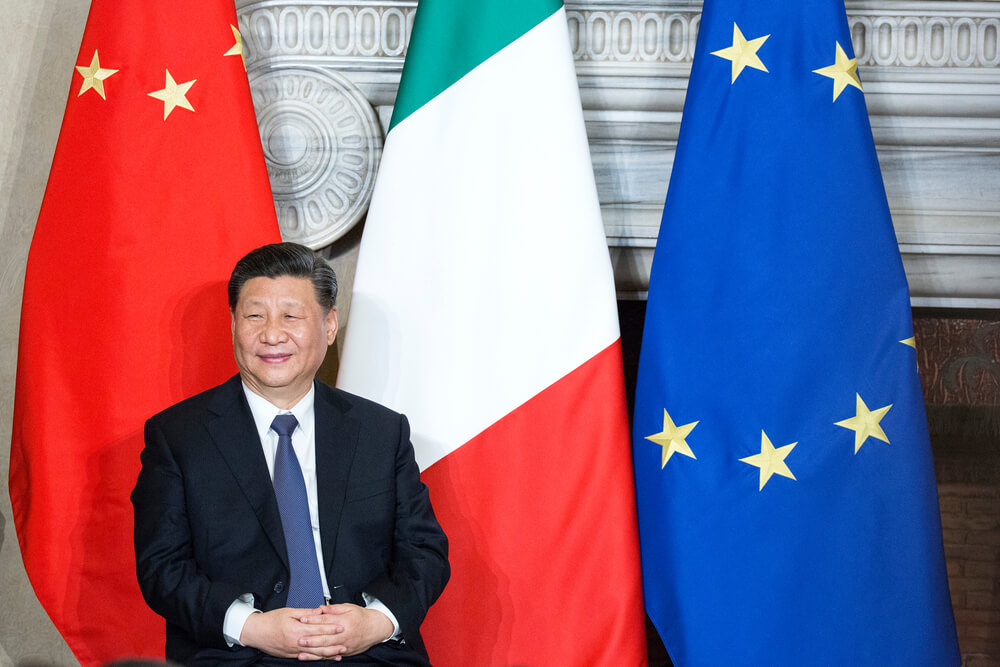On her first visit to China, Italian Prime Minister Giorgia Meloni received an incredibly warm reception in Beijing, making it difficult to draw the conclusion that relations were tense until yesterday.
Unlike other European leaders visiting Beijing and the Chinese leadership, Prime Minister Meloni travelled with a unique "burden" imposed by herself and her government in relations with China.
However, it turned out that Mrs Meloni's government's decision last December to pull out of China's Belt and Road (BRI) project has not left a mark.
On the contrary, the Italian prime minister's five-day visit to China has shown that this arrangement was an unnecessary burden and that its termination will not be the end of the world.
Prime Minister Meloni and Chinese leader Xi Jinping talked for an hour and a half, half an hour longer than expected. She then met with Premier Li Qiang, with whom she signed a plan to strengthen economic cooperation over the next three years.
Bitter pill
Due to Italy's withdrawal from the BRI, relations had been on hold for six months, but Beijing demonstrated that it had to accept this bitter pill and move on.
There was no alternative because Italy is China's fourth-largest partner in the EU, and thus Beijing would not dare react angrily to the withdrawal from the BRI, as it did in the case of Lithuania, for example.
Xi Jinping tried to give the Chinese public an impression of the vitality of the BRI
Xi Jinping tried to give the Chinese public an impression of the vitality of the BRI, and even after the conversation with Giorgia Meloni, he mentioned it several times, although in a general context and not directly in connection with Italy.
He called on China and Italy to "uphold the spirit of the Silk Road" in further cooperation rather than renew the previous arrangement, which is Xi's most important foreign policy legacy.
“China's commitment to valuing and developing relations with Italy has not changed, the nature of win-win cooperation of China-Italy relations has not changed, and the friendship between the two peoples has not changed,” said Xi, according to Xinhua News Agency.
BRI is a thing of the past
Giorgia Meloni has not mentioned BRI. The withdrawal from this project is an important foreign policy asset for her government, as well as perhaps the most important proof of Italy's commitment to Western alliances.
She once described Italy's accession to the Chinese BRI project as a "serious mistake," because this decision by Giuseppe Conte's government in 2019 represented a major political victory for China in the EU.
Mrs Meloni therefore travelled to Beijing with the idea of "relaunching" (the most commonly heard word) relations with China, this time outside the BRI framework, which turned out to be a Chinese political trap.
In Italy's case, it was also an economic trap, as trade growth increased 1.6-fold in the four-year period under the BRI agreement, but almost entirely in favour of Chinese exports.
Beijing accepted without objection a way to come out of the six-month hibernation in relations, following a model that suited Italy
Italian exports to China accounted for only 3% of total exports, which was one of the main motives of the Meloni government to end the partnership under the BRI as well as to "relaunch" relations on a new basis.
Beijing accepted without objection a way to come out of the six-month hibernation in relations, following a model that suited Italy.
The memorandum of understanding on three-year economic cooperation signed by the two prime ministers on Sunday gives a rough picture of what the main directions of mutual trade and investment would be.
These directions include the production of electric vehicles, shipbuilding, and the energy transition, but Italy's primary interest is to address the current large trade imbalance.
China accepts the conditions of the West
In this regard, China will have to be cooperative given the large outflow of foreign investors, particularly after lifting the lockdown in 2022. As a result, the Italian companies' investment in China was another key issue for the Chinese hosts during the talks.
 Xi said he was "ready to welcome Italian investors" but also promised increased imports of "high-quality Italian products."
Xi said he was "ready to welcome Italian investors" but also promised increased imports of "high-quality Italian products."
Xi said he was "ready to welcome Italian investors" but also promised increased imports of "high-quality Italian products." These are luxury goods in which Italian companies, as well as the government, see an opportunity to correct the trade imbalance, as the Chinese market capable of paying for this type of goods is estimated at almost 200 million people.
An important part of the newly thawed relations between Italy and China is Italy's agreement to EU tariffs on imports of Chinese electric vehicles of more than 30%. Despite this, key interlocutors in Beijing treated Prime Minister Meloni well, signalling that "showing teeth" to China's aggressive economic expansion is bearing fruit.
During the visit, both sides talked mainly about the need for "balance" and "loyalty" in economic relations, which is exactly what Western governments are demanding from China.